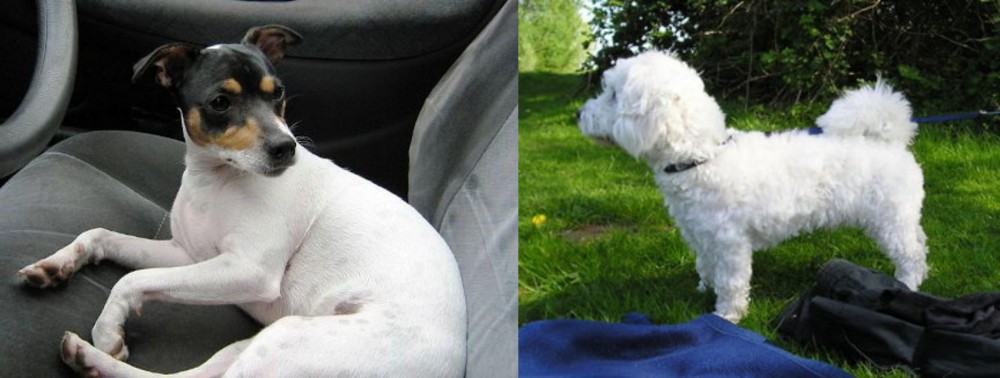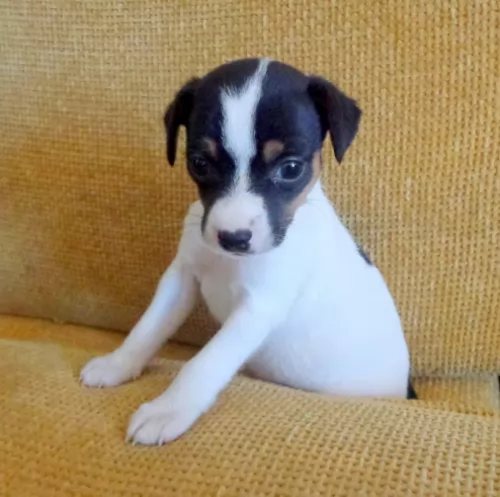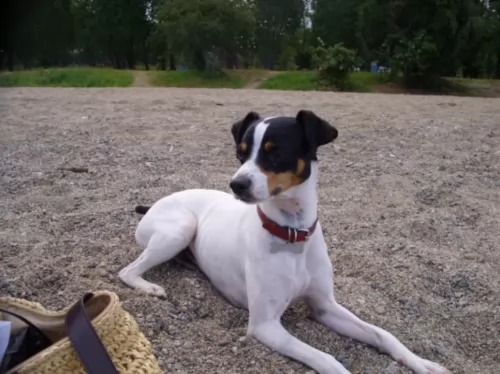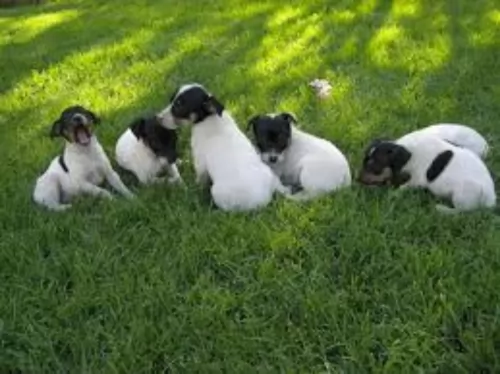 Petzlover
Petzlover Chilean Fox Terrier is originated from Chile but Franzuskaya Bolonka is originated from France. Chilean Fox Terrier may grow 13 cm / 6 inches higher than Franzuskaya Bolonka. Both Chilean Fox Terrier and Franzuskaya Bolonka are having almost same weight. Both Chilean Fox Terrier and Franzuskaya Bolonka has almost same life span. Both Chilean Fox Terrier and Franzuskaya Bolonka has almost same litter size. Both Chilean Fox Terrier and Franzuskaya Bolonka requires Low Maintenance.
Chilean Fox Terrier is originated from Chile but Franzuskaya Bolonka is originated from France. Chilean Fox Terrier may grow 13 cm / 6 inches higher than Franzuskaya Bolonka. Both Chilean Fox Terrier and Franzuskaya Bolonka are having almost same weight. Both Chilean Fox Terrier and Franzuskaya Bolonka has almost same life span. Both Chilean Fox Terrier and Franzuskaya Bolonka has almost same litter size. Both Chilean Fox Terrier and Franzuskaya Bolonka requires Low Maintenance.
 The Chilean Fox Terrier, developed in Chile, is a dog breed which comes from crossing the British Fox Terrier with some of the local Chilean dogs.
The Chilean Fox Terrier, developed in Chile, is a dog breed which comes from crossing the British Fox Terrier with some of the local Chilean dogs.
The dog is thought to have been developed in the 19th century already, some time between 1790 and 1850.
The dog is known for its skills in catching rats and mice. Known also as the Chilean Rat Terrier, Terrier Chileno or Ratonero, the Chilean Fox Terrier hasn’t achieved formal recognition with any of the leading canine organizations.
 The Franzuskaya Bolonka in France is known as the Tsvetnaya Bolonka in Russia and in Germany as the Bolonka Zwetna. All of these translate to Colored Bolognese. It is known as the “Pride of Russia” and was rediscovered by the Russians following the thaw of the Cold War. It is also sometimes translated as a colored lapdog.
The Franzuskaya Bolonka in France is known as the Tsvetnaya Bolonka in Russia and in Germany as the Bolonka Zwetna. All of these translate to Colored Bolognese. It is known as the “Pride of Russia” and was rediscovered by the Russians following the thaw of the Cold War. It is also sometimes translated as a colored lapdog.
The Bolonka is a rare breed in the toy category with ancestors in the Bichon Friese line. This little dog looks very much like the national dog of Cuba – the Havanese. In addition to the Bichon other small dogs in this ancestral line include the Shih Tzu, Toy Poodle, and Pekingese as well as the French, Italian and German Bolonka. They are often confused with the Bolognese as both breeds appear in various countries and have many similarities.
In all countries the common name for this dog is the Bolonka. They have a variety of names and nick names depending on the country. In addition to being the “Pride of Russia” he is called a Russian colored Bichon, Czechs call it the Bareyny Bolonsky, the Germans since 1980 have called it the Bolonka Zwetna but the Nordic Kennel Union does not recognize the Zwenta only the Russian Twetnaya.
The French version is seen to be the original with its ancestry dating back to the 18th century when Russian nobles were presented with a Bolonka by Louis XIV of France, and others migrated with the army of Napoleon to Russia. They were still known as the Bolonka of France. Small dogs were not popular in Russia due to the need for dogs that could work on farms and/or hunt. Particularly during the Soviet years, they were considered unnecessary. No Bolonkas were imported to Russia during the Soviet regime, so only localized breeding took place. The goal of breeders in the Soviet Union was to develop a toy dog, lap sized with an apartment living temperament.
During the cold war the Russians sent a pair of breeding Franzuskaya Bolonka to East Germany and they began to develop the breed there as well. At the same time the colored versions of the Bolonka were being bred. The Franzuskaya Bolonka is recognized by the Verband Dur Das Deutsche Hundewesen (VDF) while the other colored breeds are not. The white Bolonka is not recognized by the Federation Cynoloqique Internationale as a breed separate from the Bolognese but as simply another version. Individual clubs throughout the world recognized one or more versions of the Bolonka. They are thought to be the rarest within the Bichon family.
Today’s Bolonka is owed by Prince William and Princess Kate, giving the breed more publicity than it has had in many years.
 The Chilean Fox Terrier looks almost identical to his ancestors. He stands between 30 – 40cm and weighs between 5 to 9kg.
The Chilean Fox Terrier looks almost identical to his ancestors. He stands between 30 – 40cm and weighs between 5 to 9kg.
He is squarely proportioned, he is athletic looking and well muscled with long, slender legs. Many of these dogs are born with naturally short tails, but if not, then the tail is usually docked after the first or second vertebrae. Now that docking is falling out of favor, the breed is losing that distinctive look.
The head of the Chilean Fox Terrier is triangular with the muzzle being somewhat shorter than the Smooth Fox Terrier. The ears of the Chilean Fox Terrier are smallish and high set, being partially erect. The coat of the dog is short and thick and essentially white while the face is usually tan and black.
The Chilean Fox Terrier is loyal with his human family and can fit in well with a family where there are children and other pets.
Training and socialization become necessary for the dog so that he becomes obedient and amicable around his family and with strangers. He isn’t an aggressive dog but he is alert and can make an excellent watch dog.
He is dominant and confident and also intelligent and easily trainable. He is an active dog so he will require exercise every day, whether he lives in the city or in the country.
 The Franzuskaya Bolonka is neither heavy boned nor fine boned. They are a toy breed with a moderate bone structure. The ears are neither long nor short and they have tails that touch the back at the tip. Like others in the Bichon family the Franzuskaya Bolonka does not shed. He is a sturdy little dog and the male has a distinct beard and moustache that the females of the breed do not. They have long coats that are wavy and curly. The Franzuskaya Bolonka is of course only white. The Russian version might be brown, red, black, wolf-gray, gray and of course white.
The Franzuskaya Bolonka is neither heavy boned nor fine boned. They are a toy breed with a moderate bone structure. The ears are neither long nor short and they have tails that touch the back at the tip. Like others in the Bichon family the Franzuskaya Bolonka does not shed. He is a sturdy little dog and the male has a distinct beard and moustache that the females of the breed do not. They have long coats that are wavy and curly. The Franzuskaya Bolonka is of course only white. The Russian version might be brown, red, black, wolf-gray, gray and of course white.
 The Chilean Fox Terrier is a lively dog with an alert expression. He has become a popular companion dog, being less aggressive than other Terriers.
The Chilean Fox Terrier is a lively dog with an alert expression. He has become a popular companion dog, being less aggressive than other Terriers.
When you treat him well he becomes a loyal friend and forms a strong bond with his human owners. He gets on well with children who have been taught to respect animals, but he tends to become a bit aggressive around other dogs of the same sex.
Socialization and training however can make him much more relaxed around other dogs.
He is an attractive little dog with his short coat, giving the appearance of being well groomed. He can adapt to country- or city life too. He is such an easy dog to keep too so why not choose him as your 4-legged family member? He promises to make the perfect family companion.
 The Bolonka is great with kids, just avoid too intense play.
The Bolonka is great with kids, just avoid too intense play.
The Bolonka is a playful, lap dog with a lot of love to offer
Good adaptability great in the city in apartments and great in the country as well
They are very smart and love to learn. Being firm but beyond firm is also kind.
 The Chilean Fox Terrier is a healthy breed who doesn’t appear to have any particular health issues. It doesn’t mean that your dog will be free from disease, but it is worth knowing that a quality diet, fresh water and lots of love and attention does enhance longevity in a pet.
The Chilean Fox Terrier is a healthy breed who doesn’t appear to have any particular health issues. It doesn’t mean that your dog will be free from disease, but it is worth knowing that a quality diet, fresh water and lots of love and attention does enhance longevity in a pet.
It is to your benefit to know about one or two common diseases that your dog could get.
You’ll notice your pet’s stomach being swollen. Bloat is a disease which can become dangerous because the stomach can twist. Once this happens, gas can’t escape from the stomach and your pet will want to vomit, he’ll salivate and you’ll notice unusual restless kind of behavior. You need to get him to the vet as soon as possible.
This is also a disease that any dog can develop and can be a complication of another pet disease such as Lyme disease. One of the first signs of kidney disease in dogs is drinking more often than usual and also urinating more often.
He’ll lose his appetite and be lethargic and likely lose weight. Kidney disease is a serious disease and you will need to get your pet to the vet as soon as possible.
 Medical issues are not fully documented because of the rarity of the breed and the years of isolation in the Soviet Union.
Medical issues are not fully documented because of the rarity of the breed and the years of isolation in the Soviet Union.
 The Chilean Fox Terrier is a low maintenance breed and this means you won’t be having to part with any money on grooming sessions for him. He’ll basically require a brushing twice a week.
The Chilean Fox Terrier is a low maintenance breed and this means you won’t be having to part with any money on grooming sessions for him. He’ll basically require a brushing twice a week.
The Chilean Fox Terrier, as a smaller dog breed, will also require regular dental brushing, as neglecting this can result in dental problems as well as a host of diseases that are associated with gum disease and tooth decay.
Make sure to feed him a quality diet full of vitamins and minerals and ensure he always has fresh, cool water available.
 Feed at least 3 meals a day. Feed one fourth of a cup daily split into three meals of a high quality puppy food.
Feed at least 3 meals a day. Feed one fourth of a cup daily split into three meals of a high quality puppy food.
Feed at least 2 meals per day. Feed one half of a cup daily split into two meals of a high quality dry food.
Fairly healthy breed due to isolation during cold war
The Franzuskaya Bolonka is developed as a lap dog but that does not mean he doesn’t need daily exercise. He loves to play but play gently and not for any length of time. They like to chase balls, play hide and seek and any tricks you want to teach them.